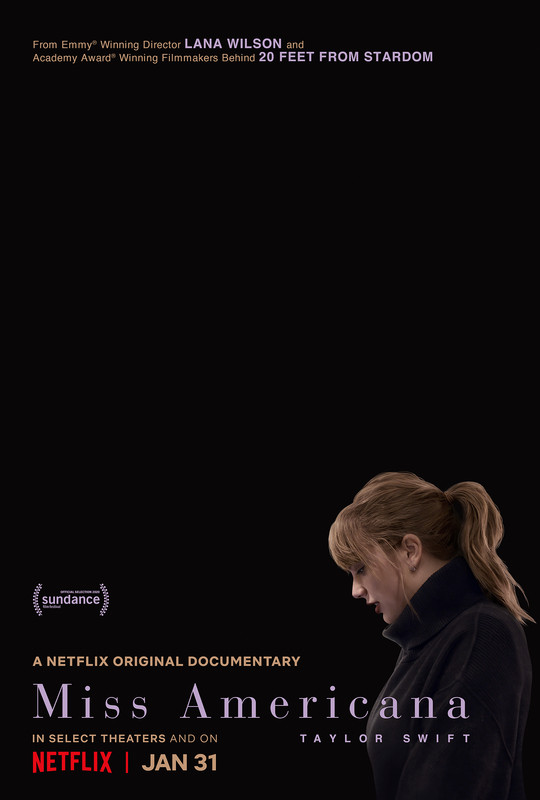Dir: Lana Wilson
Among my peers, being a Taylor Swift fan is perhaps not the most fashionable position I hold. I am a fan though. Particularly since her third album, Red, I’ve found her a talented songwriter with a knack for a well-turned lyric and, even when the record doesn’t work (as Reputation, for me, largely didn’t), her tendency to wear her themes on her sleeve means that she’s seldom less than interesting.
Lana Wilson’s documentary picks Swift up after the release of Reputation, and follows her through some of that tour and the writing and recording of her most recent album, Lover, while also looking back at her whole life as a performer. It’s a lot to try to do in 85 minutes.
Surprisingly for a film about someone who has spoken on a global scale for over a decade, Miss Americana’s overarching narrative is largely about Taylor Swift finding her voice. Swift has always been confessional in her songs, writing about boyfriends and breakups, about haters and feuds. Despite this, until an intervention in the 2018 midterm elections, she’d never (aside from supporting her LGBTQ fans) taken clear political positions, leading some on the right to assume that she was on their side and simply afraid to say so, because of potential backlash.
Some of the film’s most interesting material addresses this shift in Swift’s public engagement. We’re told how the sexual assault court case, in which she counter-sued a DJ who had been fired after he inappropriately touched her during a meet and greet, and then sued her for damages, was the tipping point for her wanting to speak out on politics on a bigger scale. This sequence leads into one of the few extended performance clips in the film, of Reputation highlight Clean. That song was always clearly about the case, but seeing them juxtaposed so closely lends even greater power to the performance.
We also see how nervous this new political engagement makes Swift’s team, with memories of what happened to the Dixie Chicks’ career after they said a single sentence speaking out against George Bush, and the eventual result when she does put out a statement. This material is some of the film’s most honest, and it really does seem as though a switch has flipped in Swift when she’s talking about it. Early interviews (often used as voiceover) say all the right things, as she talks about always looking for—living for—approval, but these interviews feel a little stiff, like she’s trying very hard to make sure that every word sounds right. Later scenes and later interviews make very plain why she is so on guard. It feels as though a breakthrough comes in the writing of The Man, a standout track from Lover that imagines how people (the press in particular) might talk about Swift if she did all the same things, but were male. Set against an interview used as voiceover late in the film about the pressures and requirements that come with being female in the entertainment industry, that song gains even greater resonance as a woman working out what she wants to simply say, in the mode she’s always been most comfortable communicating in.
This material is honest, and shows a side of Taylor Swift that we’re not used to seeing. She also exposes other vulnerabilities she hasn’t acknowledged before, notably an eating disorder, which she now appears to be dealing with in a healthy way. For all the honesty though, this film does still feel like it is maintaining a carefully curated image. It plays like an approved product, eliding over some more uncomfortable moments (notably much of the Famous controversy with Kanye West) and not delving into the degree to which Lover feels like a naked course correction from the darkness, and sometimes the pettiness, of Reputation. This isn’t to say director Lana Wilson fails to get her subject to open up, but it does have a feeling of butting up against how much Swift wants to reveal: thus far, Miss Americana (both film and person) says, but no further.
The only times the film and Swift seem to fully escape this feeling of stage management is when they are fully embedded in the making of music. This is when we see Taylor Swift, seemingly, truly happy; humming melodies for producers to help her work on, filling in missing bits of lyrics, and the moments of joy when she feels she’s hit on something. Whether her music is for you or not, I think it would be tough to watch these sequences and say she doesn’t work hard at her craft or that she’s not doing exactly what she does best.
Neither Taylor Swift or Miss Americana are perfect, but they both have something to say, and they will likely both speak to a big audience who might not otherwise engage with these ideas in the same way. There’s a lot to be said for that.
★★★½


No comments:
Post a Comment